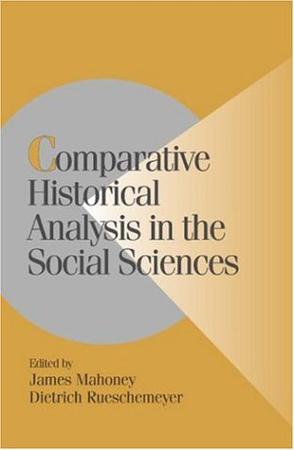The book considers the past accomplishments and future agendas of comparative-historical research in the social sciences. It defines the distinctiveness of this type of research and explores its strengths in explaining important outcomes (e.g. revolutions, social provision, democracy) in the world. It includes sections on substantive research accomplishments, methodology, and theory, and features essays by some of the most important political scientists and sociologists currently working.
This review of the accomplishments and future agendas of comparative historical research in the social sciences explores its strengths in explaining important worldwide outcomes (e.g., revolutions, social provision, democracy). It includes sections on substantive research accomplishments, methodology, and theory, and features essays by some of the most important political scientists and sociologists currently working.
James Mahoney is a comparative-historical researcher with interests in socioeconomic development, political regimes, and methodology. His most recent books are Colonialism and Postcolonial Development: Spanish America in Comparative Perspective (2010) and Explaining Institutional Change: Ambiguity, Agency, and Power (2010; co-edited with Kathleen Thelen). He is also the author of The Legacies of Liberalism: Path Dependence and Political Regimes in Central America (2001) and co-editor of Comparative-Historical Analysis in the Social Sciences (2003; with Dietrich Rueschemeyer).
His book Colonialism and Postcolonial Development: Spanish America in Comparative Perspective won four major awards from the American Sociological Association and American Political Science Association.
His article publications feature work on political and socioeconomic development in Latin America, path dependence in historical sociology, and causal inference in small-N analysis. Mahoney is a past President of the American Political Science Association (APSA) Section for Qualitative and Multi-Method Research, and he is Chair of the American Sociological Association Section for Comparative and Historical Sociology.
Dietrich Rueschemeyer is a Brown professor of sociology emeritus and Charles C. Tillinghast Jr. '32 Professor of International Studies emeritus. He currently works on state formation and historical antecedents of socioeconomic development.
He was one of the founders of Brown's Center for the Comparative Study of Development, which merged into the Watson Institute. From 1997 to 2002, Professor Rueschemeyer led the Institute's Political Economy and Development Program.
His books include Usable Theory: Analytic Tools for Social and Political Research (Princeton University Press, forthcoming in 2009); Comparative Historical Analysis in the Social Sciences (Cambribge University Press, 2003, co-edited with J. Mahoney); Participation and Democracy East and West: Comparisons and Interpretations (M. E. Sharpe, 1998, co-edited with M. Rueschemeyer and B. Wittrock); States, Social Knowledge, and the Origins of Modern Social Policies (Princeton University Press, 1996, co-edited with Th. Skocpol); Capitalist Development and Democracy (University of Chicago Press, 1992, co-authored with E. H. Stephens and J. D. Stephen); Power and the Division of Labour (Stanford University Press, 1986); and Bringing the State Back In (Cambridge University Press, 1985, co-edited with P.B. Evans and Th. Skocpol).
He received his doctorate in sociology at the University of Cologne. Before coming to Brown, he taught at the University of Cologne, Dartmouth College, and the University of Toronto. He also taught at the Hebrew University of Jerusalem, the Free University of Berlin, and the Free University of Brussels.
 Comparative Historical Analysis in the Social Sciencestxt,chm,pdf,epub,mobi下载
Comparative Historical Analysis in the Social Sciencestxt,chm,pdf,epub,mobi下载 首页
首页



历史开始于人创造神,终结于人成为神
正在看
很独特的视角
语言详实